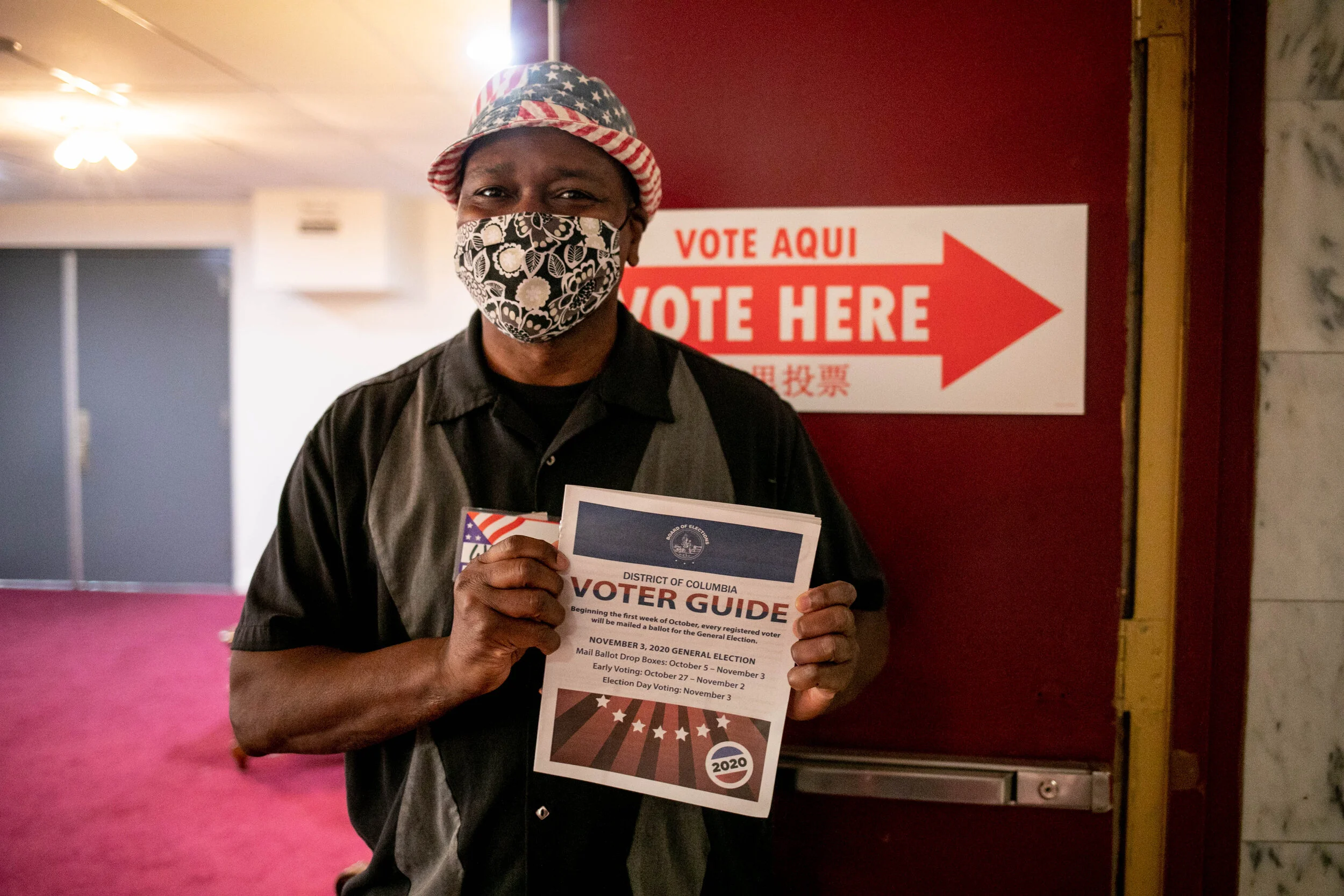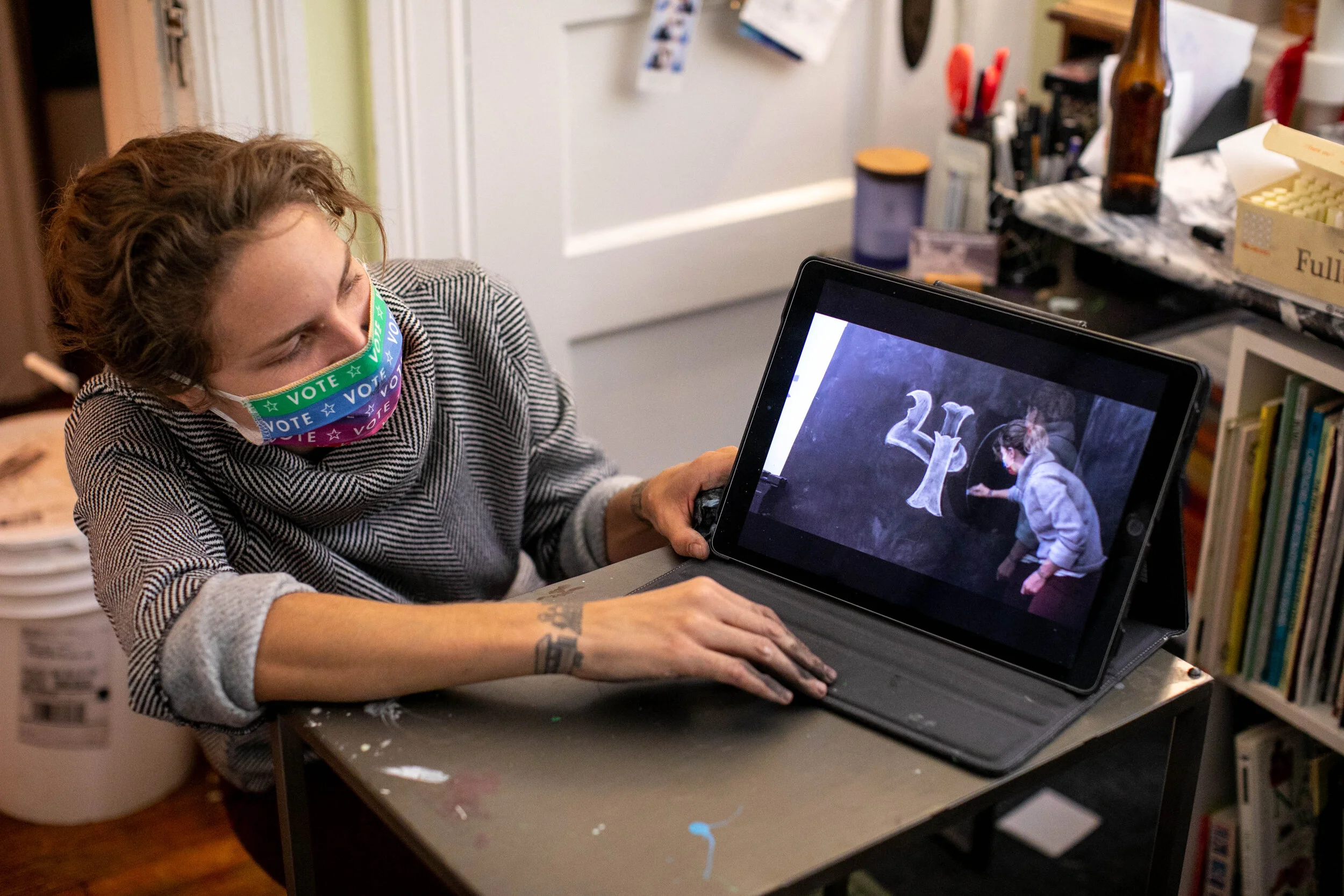There are many perceptions of what Washington D.C. is and looks like as the Nation’s Capital. While it is a secondary home to many influential politicians, it is also home to a rich history of resilient people. A city that was once considered “Chocolate City” now struggles in the face of late Capitalism gentrification as rising costs continue to burden individuals during the COVID-19 Pandemic. Amidst a time full of turmoil, individuals across the city have come together to provide mutual aid, virtual resources, and a sense of community through activism, all while navigating the limitations due to the virus.
When deciding to cover the election as a freelance journalist, I was driven to capture the personal and the communities forming, buzzing, and thriving at a grassroots level. In one of the most polarizing elections this country has ever experienced, our society has also gone through a civil unrest ignited by the pandemic – exasperating all the other epidemics that have been accumulating. While the mainstream channels focused on the oppositional energy of our current situation, I set out to document the many story lines overlapping in D.C as we experienced the same series of events. The result of these individuals taking action in the narrative of their own lives weaves together a visual story of one city’s journey of partaking in a system for the first time while simultaneously working to dismantle it.
For decades, voting poll volunteers have been elderly and retired members of society but due to the Coronavirus Pandemic, these individuals were unable to dedicate themselves because of their high risk status for contracting the virus. A variety of organizations and groups across the country advocated for people to sign up to volunteer to help voting centers during one of the most polarizing elections of American history. The results of these efforts was a diverse crowd of workers and the highest numbers of young people, the millennial generation in this case, to have ever worked the polls.
Washington D.C. was one of the regions that allowed for early voting which included 10 days prior to Election Day for individuals to cast their ballots. However, by October 31st, over half of the registered voters had casted their ballots through mail-in voting. Because of this, the voting centers in the inner city of Washington D.C. remained calm and manageable for the workers.
Chelsea Ritter-Soronen is the sole proprietor of Chalk Riot, a group of mural and pavement artists whose work focuses on community oriented activism. In preparation for the impending election day, Chelsea created a time-lapse chalk piece to go with the announcement of the 46th presidential elect, should Biden have been confirmed into office. Many artists across the country also prepared reactionary artwork regardless of whomever was to be elected.
Erin Murdock, a D.C. resident, was among one of the many millennials across the country who volunteered, as a registration clerk, to help with her local voting center.
“What drew me to work the polls this time: The stakes are so high this election cycle. When I heard that some regular poll workers (especially those who are older or immunocompromised) were opting out for COVID-19 safety reasons, I was compelled to offer my help where it was needed.
Living during this administration has been disheartening from day one. This administration has emboldened racists, passed transphobic legislation, and consistently denied climate change. I want leaders who protect and advocate for the most vulnerable, not exploit them. The greatest struggle I’ve experienced has largely been emotional, which definitely puts me in a position of privilege. It is draining to live under leadership that is so regressive.
While I’ve experienced dread and fear, I have also seen the best in my community during this time. Regardless of who is in office, we as friends and neighbors can show up for one another. While I am still learning how to be consistently involved and how to hold myself accountable, I feel a sense of responsibility to my community now more than ever”.
Volunteers for Washington D.C. local government candidates stood outside of voting centers educating incoming voters about the different options available for the various wards within the Nation’s Capital.
On Election Day I met up with local BLM activist and founder of Current Movements (D.C. based org for connecting grassroots movements through art) Katie Petitt. By November 3rd, more than 60% of DC voters had submitted their votes, so in-person voting took less than 10 minutes for Katie Petitt.
“I’m really proud of what we’ve been able to build in the past four years as a city. As a system as an organizing community we’re really strong and really connected which has come out since January 2020.
Today I’m feeling a lot of unknown whatever happens. What we’ve built as a community with mutual aid and the uprising is really beautiful and really strong and it’s not going to go away. It’s going to allow us to handle whatever comes tomorrow and the next day and the next. But as a society and a country, there’s a lot of unknown.
Holding the local affiliate of what local grassroots communities are able to do and our adaptability and our strengths. But also white supremacy is very supreme and even if Biden wins, that doesn’t fix our problems as people of color.
Just knowing that we have a lot more to do after today and that’s not going to end.”










